In today’s business world, which is changing quickly, supply chain managers have become the most important assets for organizations of all sizes and industries. As the architects of efficiency and the driving force behind seamless operations, supply chain managers are crucial in managing complex global trade and ensuring the smooth flow of goods and services from suppliers to customers.
But what exactly does a supply chain manager do, and how has their role evolved in 2023?
In this blog post, we will go deep inside the dynamic world of supply chain management, exploring the different responsibilities of supply chain managers, the essential skills they need to improve for their roles, and the educational and professional requirements that prepare them for success.
We will also cover exciting career opportunities and growth projections in supply chain management career and the importance of professional development and continuing education to stay ahead.
📖 Short Summary
Supply chain managers in 2023 will need to implement new technologies to optimize operations, reduce costs, and minimize risk.
Essential functions include monitoring inventory, evaluating performance, and utilizing emerging tech to drive efficiency & innovation.
To be the best supply chain manager in this dynamic field requires leadership skills, technical skills, and ongoing professional development.
The Role of a Supply Chain Manager
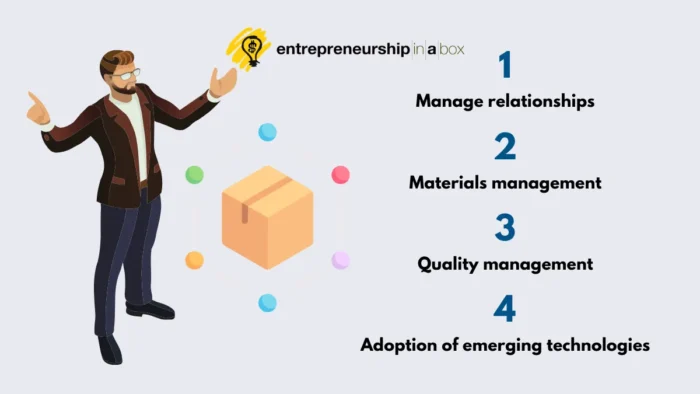
At the heart of any organization is its supply chain, a complex network of interconnected processes and entities that ensure the timely delivery of high-quality products and services to customers. Supply chain managers are the masterminds behind these operations, overseeing every step of the journey, from procuring raw materials to distributing finished goods.
The position of supply chain manager is responsible for the following:
- Establishing business relationships with suppliers and clients,
- Managing the allocation of materials (materials management), supplies, and products, and
- Ensuring the production of high-quality products (quality management).
In 2023, the role of a supply chain manager has expanded to include the adoption of emerging technologies, such as robotic process automation (RPA), cloud computing, artificial intelligence (AI), and the Internet of Things (IoT), to optimize supply chain operations, minimize costs, and mitigate risk. From strategic or tactical purchasing to demand planning and project management, supply chain managers are at the forefront of innovation, driving efficiency and customer satisfaction across the entire production process.
The Importance of Supply Chain Management
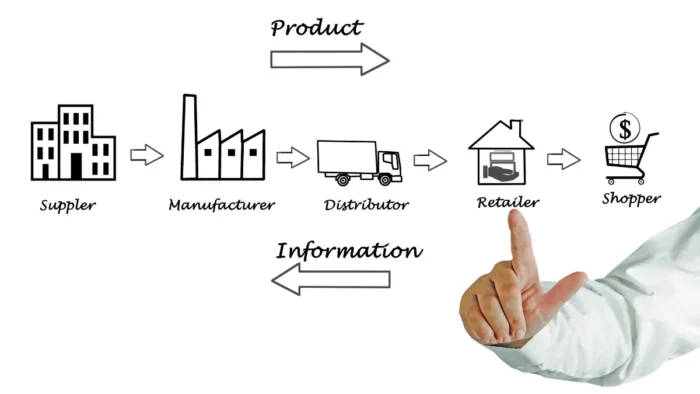
Effective supply chain management is essential to the success of any business, as it directly impacts the bottom line by helping to minimize costs, optimize quality, and increase customer satisfaction. In today’s competitive marketplace, a well-designed supply chain can mean the difference between a thriving company and one that struggles to keep up with the demands of its customers.
Supply chain managers have a pivotal role in this process because they are:
- supervising manufacturing and distribution processes,
- sourcing materials or products,
- negotiating contracts,
- using software to track goods,
- using data analytics to forecast demand and analyze performance,
- reducing costs while maintaining quality,
- establishing relationships with suppliers and partners, and
- innovating the supply chain process.
Their ability to take a logical and systematic approach to these responsibilities is vital in ensuring that the organization’s supply chain remains agile, resilient, and responsive to ever-changing market conditions.
Key Functions of a Supply Chain Manager
In 2023, a supply chain manager’s key functions are centered around five core areas:
- logistics,
- operations,
- planning,
- sourcing, and
- supply chain strategy.
These professionals are responsible for monitoring and maintaining inventory levels, evaluating operational performance, and addressing any issues that may arise with vendors or suppliers to maintain quality standards throughout the entire supply chain, including shipping.
As the business world becomes increasingly digital and interconnected, supply chain managers must also embrace emerging technologies and harness their potential to drive efficiency and innovation. By using tools such as RPA, AI, and IoT, supply chain managers can optimize their operations, minimize costs, and better anticipate and respond to customer demand.
Essential Skills for Supply Chain Managers
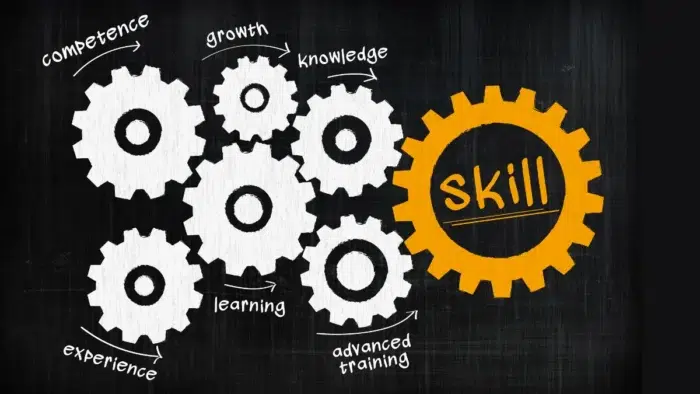
To succeed in the world of supply chain management, supply chain managers must possess a unique mix of skills that will help them effectively overcome the complex challenges they face daily. These essential skills can be broadly categorized into three main areas:
- leadership and teamwork,
- analytical and problem-solving skills, and
- technical skills.
In the next sections, we will go deeper into each of these skill sets, exploring their significance in the context of supply chain management and discussing the various ways in which supply chain managers can develop and use these crucial competencies.
Leadership and Teamwork
Leadership and teamwork are of great importance for supply chain managers in 2023, as they facilitate the management of complex multi-sides relationships, provide solutions to issues, and enable economic success. A supply chain manager must be able to effectively guide and motivate teams, communicate clearly and persuasively with various stakeholders, and build strong relationships across the organization and also with external partners.
Successful leadership and teamwork will require strong communication and interpersonal skills, the capacity to think critically and strategically, and the ability to work collaboratively with others. As supply chain managers navigate the complex network of interdependent processes, entities and relationships that make up their organization’s supply chain, their ability to lead and work effectively with others becomes a critical factor in ensuring smooth operations and achieving business objectives.
Analytical and Problem-Solving Skills
In today’s data-driven world, analytical and problem-solving skills are essential for supply chain managers, as they enable them to effectively overcome all challenges, make the right decisions, and maximize the company’s operations.
These skills involve the capacity to evaluate and process data, recognize patterns, and devise solutions to complex problems, which are all crucial components of supply chain management.
Supply chain managers in 2023 must remain knowledgeable of current technology, be able to adjust to varying market conditions, and efficiently manage multiple projects simultaneously in order to succeed.
You can strengthen your analytical and problem-solving capabilities by enrolling in data analysis courses, participating in seminars and workshops, and engaging in self-study.
Technical Skills
Having technical skills is essential for supply chain managers in 2023 in order to effectively manage supply chain operations, which are becoming more complex due to technological advances. These professionals need to possess technical skills such as project management, familiarity with e-business and e-procurement systems, logistics competencies, and analytical capabilities.
In addition, supply chain managers must be able to adapt to new technologies and integrate them into their operations, ensuring that their organization remains competitive in the digital age. This includes staying up-to-date on the latest advancements in automation, sustainability, and resilience, and applying these innovations to optimize supply chain processes.
Educational and Professional Requirements

Pursuing a career in supply chain management typically entails obtaining a bachelor’s degree in supply chain management or a related discipline, such as logistics, business, or operations management. In addition to formal education, relevant work experience and internships are also crucial in preparing individuals for success in this field, providing them with the practical skills and knowledge needed to excel in their roles.
In the following sections, we will explore the various degree programs and certifications available to aspiring supply chain managers, as well as the importance of work experience and internships in building a solid foundation for a successful career in supply chain management.
Degree Programs and Certifications
For those looking to enter the field of supply chain management, a bachelor’s degree in a relevant discipline is essential. Degree programs in supply chain management, logistics, business, or operations management provide students with a comprehensive understanding of the principles and practices that underpin the field.
In addition to formal education, certifications such as the APICS Certified Supply Chain Professional Certification (CSCP) and the APICS Certified in Production and Inventory Management (CPIM) are highly valuable in demonstrating one’s expertise and commitment to the profession. These certifications can enhance a resume for career advancement or working for competitive organizations.
Work Experience and Internships
Gaining practical experience in the field of supply chain management is crucial for developing the skills and knowledge necessary to excel in one’s career. Work experience and internships offer invaluable opportunities to apply the theoretical concepts learned in the classroom to real-world situations, enabling individuals to improve their problem-solving, communication, and teamwork skills.
Summer internships and placement years during degree courses are viable options for gaining relevant work experience. Larger logistics companies and organizations, including supermarkets, offer summer internships in supply chain management, providing students with the opportunity to develop their skills, build their professional networks, and gain a competitive edge in the job market.
Career Opportunities and Growth in Supply Chain Management

The outlook for supply chain management in 2023 is promising, with a high demand for logisticians and supply chain specialists.
The industry is expected to experience growth and advancements in automation, sustainability, and resilience, creating numerous career growth opportunities.
In the following sections, we will explore the various job titles and roles that supply chain managers can expect to assume in 2023, as well as the industry demand and growth projections that underscore the importance of this thriving field.
Job Titles and Roles
In 2023, supply chain managers may be asked to assume roles such as logistics manager, supply chain analyst, inventory manager, and procurement manager. These roles involve overseeing the supply chain process, managing inventory, and negotiating with suppliers, among other responsibilities.
The specific job titles and roles available in supply chain management vary depending on the industry and the size and structure of the organization. However, regardless of the specific title, all supply chain managers play a key role in ensuring the smooth and efficient operation of their supply chain, ultimately contributing to the business’s success as a whole.
Industry Demand and Growth Projections
Industry demand and growth projections are of great importance for supply chain managers in 2023, as they enable managers to foresee and address issues, recognize potential risks and opportunities, and adjust their strategies accordingly. The anticipated job growth rate for supply chain management between 2021 and 2031, according to the US Bureau of Labor Statistics, is an impressive 28 percent, highlighting the increasing importance of this field in the modern business landscape.
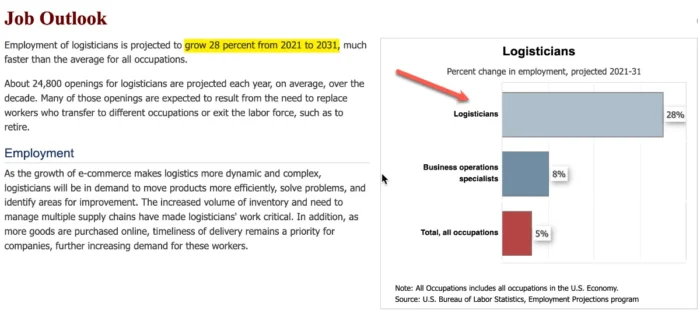
This robust growth projection underscores the critical role that supply chain managers play in today’s economy as they work to optimize efficiency, reduce costs, and ensure the timely delivery of products and services to customers. As the industry continues to evolve and adapt to new technologies and market conditions, supply chain managers who stay ahead of the curve through ongoing professional development and education will be well-positioned to capitalize on the growing demand for their expertise.
Professional Development and Continuing Education

Supply chain managers must stay fluent in recent industry trends and technologies to remain competitive and expand their job opportunities. This can be achieved through professional development and continuing education, which provides supply chain managers with the requisite expertise and understanding to excel in their positions.
In the following sections, we will discuss the various industry certifications and memberships available to supply chain managers and the online courses and specializations that can help them stay ahead of the curve in this dynamic and fast-paced field.
Industry Certifications and Memberships
Industry certifications and memberships, such as those offered by the Chartered Institute of Procurement & Supply (CIPS) and the Chartered Institute of Logistics & Transport (CILT), are valuable resources for supply chain managers looking to showcase their expertise and capabilities in the field. Membership in these organizations provides access to events, resources, advice, and networking opportunities, helping supply chain managers stay up-to-date on industry trends and best practices.
To attain full membership of CIPS, applicants must provide evidence of either an accredited undergraduate or postgraduate degree or completion of the required CIPS professional qualifications in procurement and supply.
These certifications and memberships can enhance a supply chain manager’s resume and facilitate career advancement, particularly in competitive organizations.
Online Courses and Specializations
A wide range of online courses and specializations are available to supply chain managers, encompassing topics such as supply chain management, logistics, operations management, data analysis, and more. These courses allow supply chain managers to stay informed about the most recent industry trends and technologies, acquire valuable skills and knowledge, and consequently progress in their careers.
In order to identify the appropriate online courses and specializations, it is advisable to conduct research on the available options, evaluate the various programs, and ensure that the courses are pertinent to the supply chain manager’s present and future objectives.
By investing in their professional development and continuing education, supply chain managers can position themselves for success in this dynamic and ever-evolving field.
Summary
In conclusion, supply chain managers play a critical role in today’s business landscape, ensuring the smooth flow of goods and services from suppliers to customers while driving efficiency and optimizing operations. Supply chain managers must possess a unique mix of leadership and teamwork, analytical and problem-solving skills, and technical skills to excel in this dynamic and complex field.
By pursuing the appropriate educational and professional qualifications, gaining valuable work experience and internships, and engaging in ongoing professional development and continuing education, supply chain managers can stay ahead of the curve and position themselves for success in this thriving industry. As the field continues to evolve and grow, those who embrace the challenges and opportunities it presents will be well-equipped to lead the way in ensuring the success of businesses worldwide.
Frequently Asked Questions
As a supply chain manager, you oversee the entire production and distribution process of a company’s goods. You coordinate, organize, and manage the identification, acquisition, production, and delivery of all products to ensure quality standards are met. This includes managing the supply chain from the raw materials stage to the finished product stage. You must also ensure that the supply chain is efficient and cost-effective. You must also be able to identify and address any problems.
Yes, supply chain management can be a lucrative career path. According to Indeed, this field provides ample financial rewards for those with the right skills, with an average salary of more than $90,000 per year and a range extending to more than $140,000.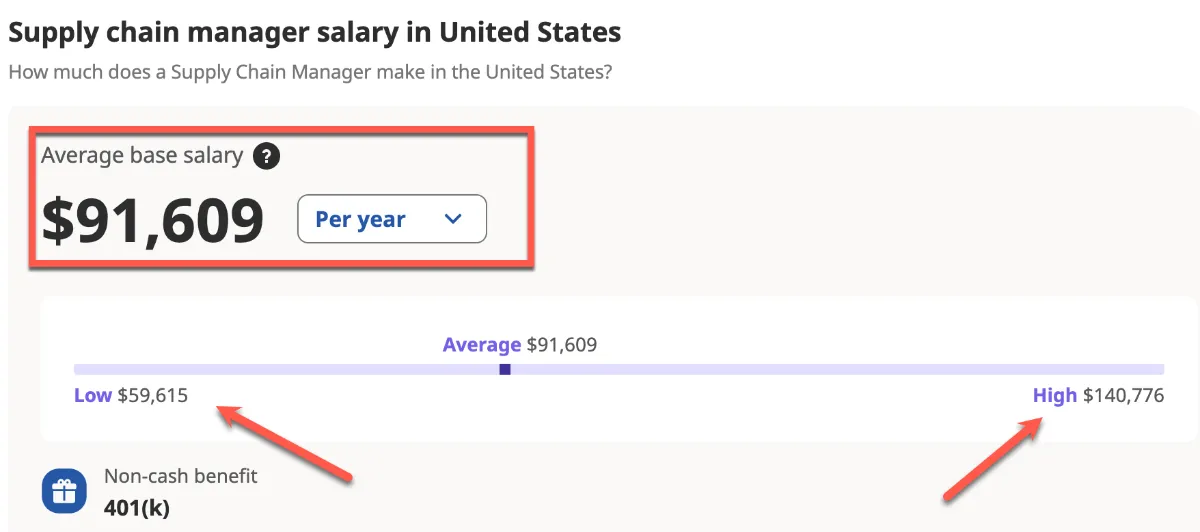
To be a successful supply chain manager, you must have strong organizational, problem-solving, and decision-making skills. You must also understand inventory and risk management, IT automation, customer service, market research, and procurement processes. Additionally, certifications can help demonstrate your knowledge and proficiency in the field.
As a supply chain manager, your role is to ensure the efficient delivery of goods and services from the point of origin to the point of consumption. This includes overseeing the procurement of raw materials, implementing production processes, and distributing finished products to customers. Optimizing the supply chain requires strategic planning, problem-solving, and organizational skills.
Daily, supply chain managers work to improve efficiency, reduce costs, and ensure the quality of goods and services. They analyze data, communicate with suppliers, monitor the flow of materials, track inventory levels, develop strategies for new products or services, and oversee logistics processes. Supply chain managers must be able to identify areas of improvement and develop solutions to optimize the supply chain. They must also be able to collaborate with other departments and stakeholders to ensure that the supply chain is running smoothly.





